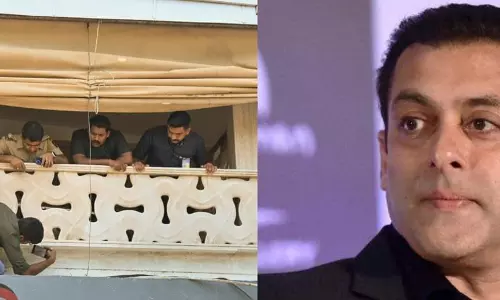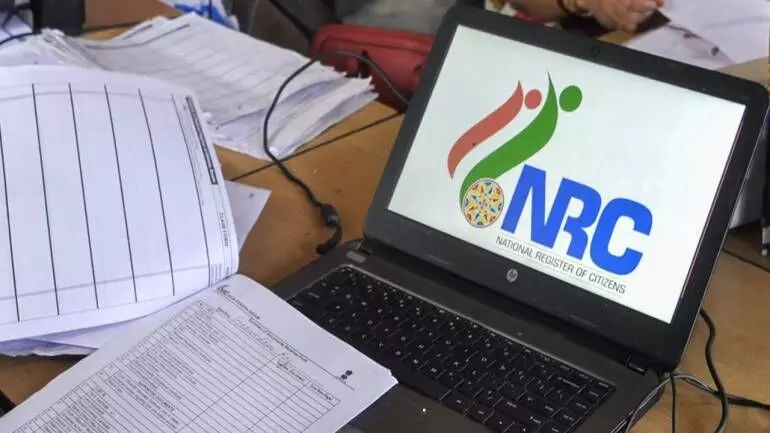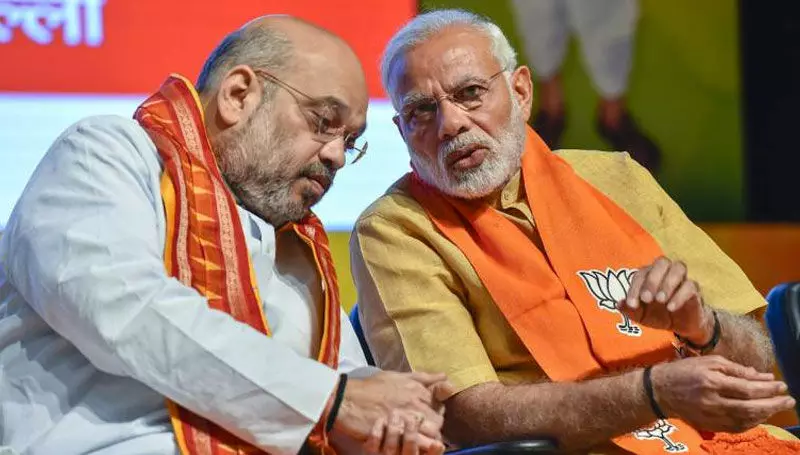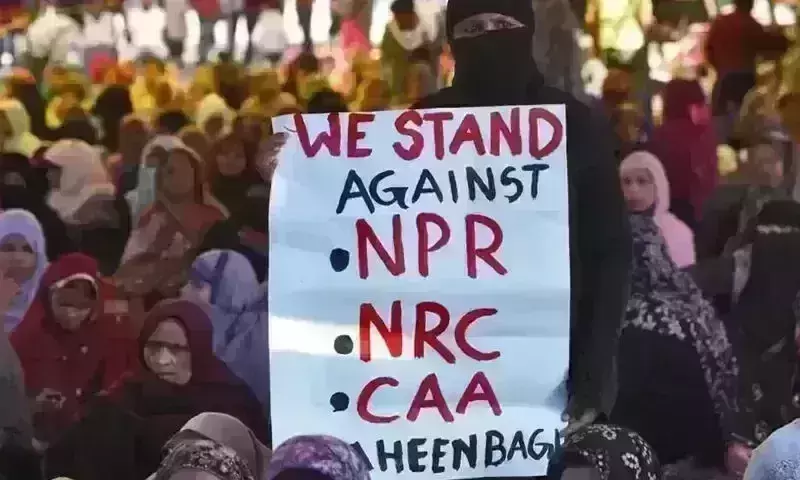
Citizenship questions at the doorstep
text_fieldsThe latest jolt in the matter of citizenship was the May 28 notification by the Centre inviting citizenship applications of migrants from Pakistan, Afghanistan and Bangladesh residing in 13 designated districts of Gujarat, Rajasthan, Chattisgarh, Haryana and Punjab. The applicants have to be Hindu, Sikh, Buddhist, Jain, Parsi or Christian (byword for non-Muslims). The Ministry of Home Affairs (MHA) notification also authorised the district authorities to process such online applications and this was according to the Citizenship Act, 1955 and the rules issued thereon in 2009. Notably, this was not in line with the Citizenship Amendment Act 2019 (CAA) which had triggered much protests and agitations and according to which foreign nationals from these countries who had arrived in India until 2014 were entitled to seek citizenship, provided they were from these religions. However, the 1955 Act had provided for migrants to obtain citizenship on completion of 11 years. The new move of the May 28 order has sparked protests that the circular issued during pendency of the formulation of rules under CAA, 2019, as stated in the Supreme Court, tantamounts to a roundabout move to grant citizenship instead of through the rules to be issued under CAA. And predictably, petitions have been filed in the Supreme Court against the new circular, prominent among them being that of Indian Union Muslim League. The League argued that if citizenship is granted on the strength of this and later if the basic law is struck down by the court, it would be difficult to take back such citizenship.
Due to Covid and the severe criticisms faced by the Central government internally and at international level about its handling by the Centre, moves to grant and deny citizenship under the processes of National Register of Citizens (NRC), National Population Register (NPR) and the CAA, have been stalled temporarily. The Centre's dramatic move comes in this background. However, to recall a recent statement of status by the government, in a reply about NPR given by MHA to the parliamentary committee in mid-March it said this: the draft data of the latest census and NPR will be ready before the general election of 2024. The most recent census was conducted in 2011 and NPR was renewed in 2015. The first step of NPR, i.e, residential census should have been made in April 2020, but due to Covid, it could not be completed. And according to the temporary time-line given to the parliamentary committee, the preliminary data for the census would be ready in financial year 2023-24, and preliminary figures of rural sector would be made available through that.
Ambiguities and equivocations
However, in answer to a query raised on March 17 by Muslim League member PV Abdul Wahab (whether the government had any plan to implement NRC throughout the country), Union Minister of State for Home Nityanand Rai said there was no such decision 'till now'. The same reply had been given in March 2020 when CPI member Binoy Viswam and DMK member Tiruchi Siva had raised the same question.
Only a careful examination would reveal the interconnection between CAA,NCR and NPR and the inconsistencies in the Centre's public stances regarding them, i.e. the disconnect between the its political posturing on the one hand and its replies to parliament and the judiciary on the other. That would tell the sneaky manner the regime has been going about it. In the first place, it is important to understand that census is an exercise undertaken under the Census Act of 1948 and NPR a mechanism as provided in the Rules of the 1955 Citizenship Act. It may be recalled that in the same month of March, when Binoy Viswam and Tiruchu Siva got the reply, the Central Home Ministry had filed an affidavit in the Supreme Court saying that NRC was a "necessary exercise for any sovereign country for mere identification of citizens from non-citizens".
On November 16, 2016 the then Minister of State for Home Kiren Rijiju stated: "The Government has approved the preparation of Population Register comprising details of usual residents in the country. The preparation of Population Register is a part of preparation of NRIC under provisions of the Citizenship Act, 1955 read with the Citizenship Rules (2003)." (https://bit.ly/3ipdjtP) It is this act of linking NPR to NRC that prompts many states to oppose it and to decline to take steps for NPR.
Further, on 18 November 2020, in an RTI reply to the Hindu newspaper, Registrar General of India stated that the questionnaire for NPR was being given final shape, but information about the first phase of the 2021 Census was not available.
States against NPR
Over a dozen states have taken a stance against renewal of NPR, for the very reason of its linking with the controversial NRC and CAA. The government sources deny that NPR will be used for NRC, but that is seen more as a ploy to let the NPR go through unhindered. But more pertinently, states of West Bengal and Rajasthan raised their objection on grounds of the additional items of data sought in the NPR questionnaire, such as the place and date of birth of a person's father and mother, last place of residence and mother tongue - data not essential in population statistics. Further indications of NPR aiming at more than mere census had already been given away by Deputy Registrar General in another part of his reply on census which says: the 2021 census process is still evolving and disclosing them would confuse people and hamper the work. Therefore they were withheld invoking Section 8(1) of the RTI Act. However the section in question mostly includes reasons by which information can be declined such as those affecting sovereigny and integrity of the country, the scientific or economic interest of the State, matters related to a foreign country etc.
It may be recalled that during the pre-test phase of NPR data collection of 2019 covering about 30 lakh people on 21 parameters, together with the place of birth of father and mother, place of residence, details were also sought of documents such as Aadhaar (optional), Voter ID, mobile phone and driving licence. The point to note is that in 2010 and 2015, NPR data were collected only on 14 items, as against this 21.
When CAA figures in the matrix
What figures prominently in the matrix of citizenship debates, beyond legal and technical level and more in the people's perspective, is the core provision in the CAA passed into law on 11 December 2019. This provision enables granting of citizenship to migrants who had entered India before 2014 from Pakistan, Bangladesh and Afghanistan who belong to Hindu, Sikh, Buddhist, Jain, Parsi and Christian religions (clearly excluding Muslims). Given that the BJP and the sangh parivar who steer the current ruling entity raise exclusion of Muslims to the level of a theory, albeit not expressly advocated, the process of collecting data for NPR and NRC are of crucial importance. Though NPR process does not demand production of supporting documents, NCR by its nature and in all probability will. Thus, in this game plan, first comes NPR with data beyond the scope of mere demographic data where non-citizens also can be included. Next is NRC based on data gathered in NPR whereby many may get excluded on purely technical grounds and based strictly on NPR data. Those so excluded may be eligible for citizenship under CAA, but not Muslims as the law has excluded them. And the Muslim segment thus excluded can be treated at the mercy of the regime, or without any mercy too.
However, the fact remains that the CAA enacted in December 2019 has been challenged in the Supreme Court by at least 140 petitions. Although several petitioners had sought stay of CAA implementation, the government took umbrage under the plea that the rules for CAA had not been framed and therefore would not be implemented forthwith. And the court accepted that and declined to stay it.
It is behind this confusing shroud of statements in the court and public posturing that Home Minister Amit Shah keeps saying CAA rules would be released after the Covid crisis for implementation. The sad fact remains that on a matter of such a decisive impact on the country's population, the judiciary has been deferring their hearing - which is a different theme altogether meriting review separately. But in the meantime, CAA by stealth is being attempted such as in the May 28 order.
Flashback: The time was when media were abuzz with reports about a bill in parliament to introduce forward class economic reservation. An unstarred question in the Lok Sabha on 8 January was this: Is the government considering any possibility of giving reservation to the poor section of forward classes? The answer: No. That was at 11 a.m. Come 12.45 pm and there is the Economic Weaker Sections (EWS) reservation bill. To be fair, the members were provided with the draft of that bill a few minutes before that. No advance notice, no Standing Committee discussion, no Select Committee. Therefore, nothing can be ruled out from this government that may swear there is no immediate NRC, and no NPR that soon.


























